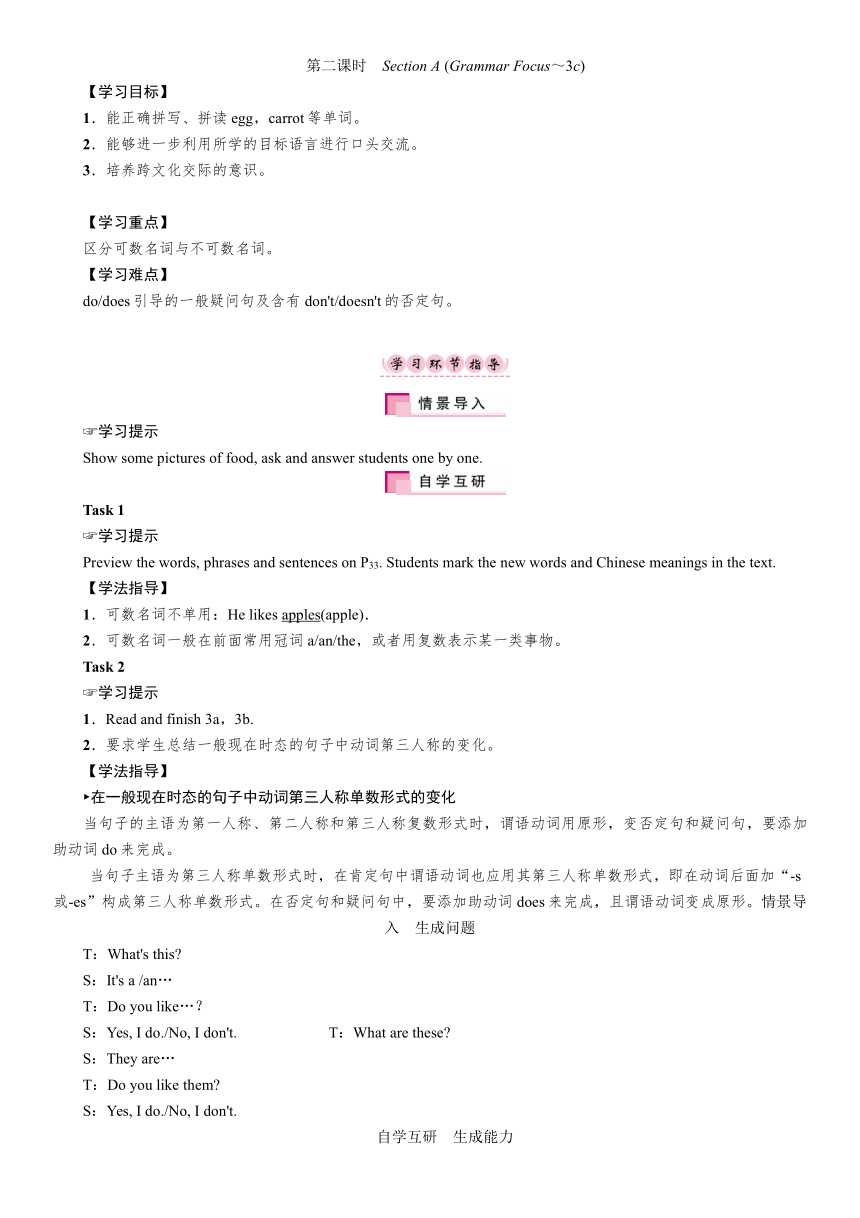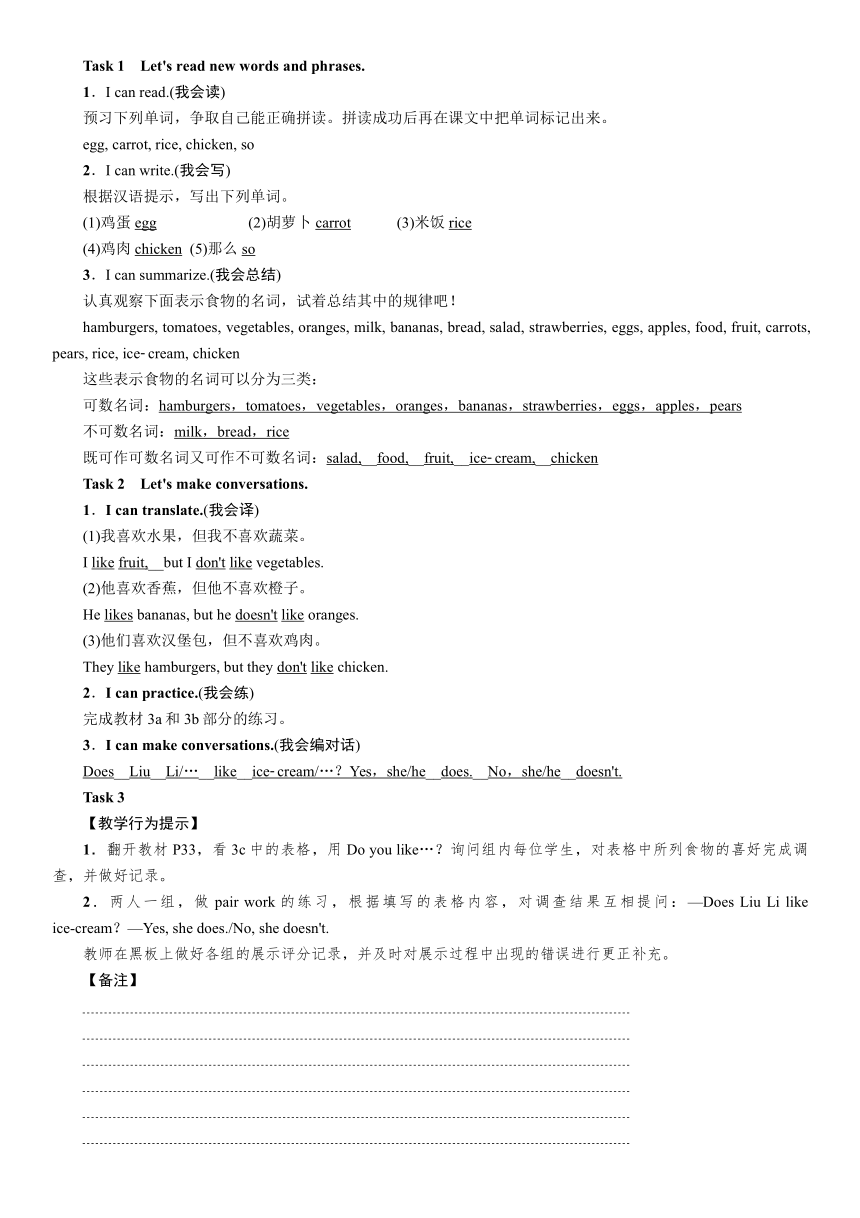人教版七年级上 Unit 6 Do you like bananas? Section A (Grammar Focus-3c) 学案
文档属性
| 名称 | 人教版七年级上 Unit 6 Do you like bananas? Section A (Grammar Focus-3c) 学案 |

|
|
| 格式 | doc | ||
| 文件大小 | 117.5KB | ||
| 资源类型 | 教案 | ||
| 版本资源 | 人教新目标(Go for it)版 | ||
| 科目 | 英语 | ||
| 更新时间 | 2022-07-07 00:17:49 | ||
图片预览


文档简介
第二课时 Section A (Grammar Focus~3c)
【学习目标】
1.能正确拼写、拼读egg,carrot等单词。
2.能够进一步利用所学的目标语言进行口头交流。
3.培养跨文化交际的意识。
【学习重点】
区分可数名词与不可数名词。
【学习难点】
do/does引导的一般疑问句及含有don't/doesn't的否定句。
INCLUDEPICTURE"教学环节指导.TIF" INCLUDEPICTURE "../教案·七上英语(人教)/教学环节指导.TIF" \* MERGEFORMAT INCLUDEPICTURE "教学环节指导.TIF" \* MERGEFORMAT INCLUDEPICTURE "教学环节指导.TIF" \* MERGEFORMAT
INCLUDEPICTURE"情景导入.TIF" INCLUDEPICTURE "../教案·七上英语(人教)/情景导入.TIF" \* MERGEFORMAT INCLUDEPICTURE "情景导入.TIF" \* MERGEFORMAT INCLUDEPICTURE "情景导入.TIF" \* MERGEFORMAT
学习提示
Show some pictures of food, ask and answer students one by one.
INCLUDEPICTURE"自学互研.TIF" INCLUDEPICTURE "../教案·七上英语(人教)/自学互研.TIF" \* MERGEFORMAT INCLUDEPICTURE "自学互研.TIF" \* MERGEFORMAT INCLUDEPICTURE "自学互研.TIF" \* MERGEFORMAT
Task 1
学习提示
Preview the words, phrases and sentences on P33. Students mark the new words and Chinese meanings in the text.
【学法指导】
1.可数名词不单用:He likes apples(apple).
2.可数名词一般在前面常用冠词a/an/the,或者用复数表示某一类事物。
Task 2
学习提示
1.Read and finish 3a,3b.
2.要求学生总结一般现在时态的句子中动词第三人称的变化。
【学法指导】
在一般现在时态的句子中动词第三人称单数形式的变化
当句子的主语为第一人称、第二人称和第三人称复数形式时,谓语动词用原形,变否定句和疑问句,要添加助动词do来完成。
当句子主语为第三人称单数形式时,在肯定句中谓语动词也应用其第三人称单数形式,即在动词后面加“ s或 es”构成第三人称单数形式。在否定句和疑问句中,要添加助动词does来完成,且谓语动词变成原形。情景导入 生成问题
T:What's this
S:It's a /an…
T:Do you like…?
S:Yes, I do./No, I don't. T:What are these
S:They are…
T:Do you like them
S:Yes, I do./No, I don't.
自学互研 生成能力
Task 1 Let's read new words and phrases.
1.I can read.(我会读)
预习下列单词,争取自己能正确拼读。拼读成功后再在课文中把单词标记出来。
egg, carrot, rice, chicken, so
2.I can write.(我会写)
根据汉语提示,写出下列单词。
(1)鸡蛋 egg (2)胡萝卜 carrot (3)米饭 rice
(4)鸡肉 chicken (5)那么 so
3.I can summarize.(我会总结)
认真观察下面表示食物的名词,试着总结其中的规律吧!
hamburgers, tomatoes, vegetables, oranges, milk, bananas, bread, salad, strawberries, eggs, apples, food, fruit, carrots, pears, rice, ice cream, chicken
这些表示食物的名词可以分为三类:
可数名词:hamburgers,tomatoes,vegetables,oranges,bananas,strawberries,eggs,apples,pears
不可数名词:milk,bread,rice
既可作可数名词又可作不可数名词:salad,__food,__fruit,__ice cream,__chicken
Task 2 Let's make conversations.
1.I can translate.(我会译)
(1)我喜欢水果,但我不喜欢蔬菜。
I like fruit,__but I don't like vegetables.
(2)他喜欢香蕉,但他不喜欢橙子。
He likes bananas, but he doesn't like oranges.
(3)他们喜欢汉堡包,但不喜欢鸡肉。
They like hamburgers, but they don't like chicken.
2.I can practice.(我会练)
完成教材3a和3b部分的练习。
3.I can make conversations.(我会编对话)
Does__Liu__Li/…__like__ice cream/…?Yes,she/he__does.__No,she/he__doesn't.
Task 3
【教学行为提示】
1.翻开教材P33,看3c中的表格,用Do you like…?询问组内每位学生,对表格中所列食物的喜好完成调查,并做好记录。
2.两人一组,做pair work的练习,根据填写的表格内容,对调查结果互相提问:—Does Liu Li like ice cream?—Yes, she does./No, she doesn't.
教师在黑板上做好各组的展示评分记录,并及时对展示过程中出现的错误进行更正补充。
【备注】
4.I can summarize.(我会总结)
(1)总结询问别人对食物喜好的句型及回答。
Does__he/she__like…?常用来询问第三人称单数对某种食物的喜好。
其答语为:Yes,he/she__does./No, he/she__doesn't.
Do__they__like…?常用来询问第三人称复数对某种事物的喜好。
其答语为:Yes, they__do./No, they__don't.
(2)介绍对某种食物喜欢与否的句式。
I/We/They__like…,__but__I/we/they__don't__like…常用来介绍第一人称和第三人称复数对某种事物的喜好。
He/She__likes…,__but__he/she__doesn't__like…常用来介绍第三人称单数对某种事物的喜好。
Task 3 Make a survey and finish 3c on P33.
交流展示 生成新知
INCLUDEPICTURE"交流预展.TIF" INCLUDEPICTURE "../教案·七上英语(人教)/交流预展.TIF" \* MERGEFORMAT INCLUDEPICTURE "交流预展.TIF" \* MERGEFORMAT INCLUDEPICTURE "交流预展.TIF" \* MERGEFORMAT
Show in groups.(Time:six minutes)
First, the students read the words and phrases in groups.Then,read together and sum up the usage of the words in groups. At last,write down contents on the blackboard.
First, the group leaders ask members to check the answers and perform the conversations, then mark the difficult points.(they can ask the teacher for help)
INCLUDEPICTURE"展示提升.TIF" INCLUDEPICTURE "../教案·七上英语(人教)/展示提升.TIF" \* MERGEFORMAT INCLUDEPICTURE "展示提升.TIF" \* MERGEFORMAT INCLUDEPICTURE "展示提升.TIF" \* MERGEFORMAT
Class show.(Time:sixteen minutes)
1.I can read.①Read together,pay attention to the pronunciation of “carrot” and “chicken”;②Consolidate the words learning by word games.
2.I can write.①Students translate the phrases into English by answering quickly;②Read together.
3.I can summarize.
1.I can translate.①Ask a few students to translate the key sentences in task 2;②Read together;③Explain the usages of do and does.
2.I can practice.①Ask students to finish 3a,3b;②Check the answers by answering quickly and explain.
3.I can make conversations.①Students make dialogues according to the tasks;②Perform the dialogues.
4.I can summarize.
当堂演练 达成目标
根据上下文补全句子,每空一词。
1.—Does Eric like rice with chicken
—No, he doesn't.
2.—Does your uncle have a soccer ball
—No, he doesn't. But my cousin has a soccer ball.
3.—Do your sisters like salad
—Yes, they do.
4.—Do you like oranges
—Yes, I do. But my mother doesn't like oranges.
课后反思 查漏补缺
收获:________________________________________________________________________
困惑:________________________________________________________________________
【学习目标】
1.能正确拼写、拼读egg,carrot等单词。
2.能够进一步利用所学的目标语言进行口头交流。
3.培养跨文化交际的意识。
【学习重点】
区分可数名词与不可数名词。
【学习难点】
do/does引导的一般疑问句及含有don't/doesn't的否定句。
INCLUDEPICTURE"教学环节指导.TIF" INCLUDEPICTURE "../教案·七上英语(人教)/教学环节指导.TIF" \* MERGEFORMAT INCLUDEPICTURE "教学环节指导.TIF" \* MERGEFORMAT INCLUDEPICTURE "教学环节指导.TIF" \* MERGEFORMAT
INCLUDEPICTURE"情景导入.TIF" INCLUDEPICTURE "../教案·七上英语(人教)/情景导入.TIF" \* MERGEFORMAT INCLUDEPICTURE "情景导入.TIF" \* MERGEFORMAT INCLUDEPICTURE "情景导入.TIF" \* MERGEFORMAT
学习提示
Show some pictures of food, ask and answer students one by one.
INCLUDEPICTURE"自学互研.TIF" INCLUDEPICTURE "../教案·七上英语(人教)/自学互研.TIF" \* MERGEFORMAT INCLUDEPICTURE "自学互研.TIF" \* MERGEFORMAT INCLUDEPICTURE "自学互研.TIF" \* MERGEFORMAT
Task 1
学习提示
Preview the words, phrases and sentences on P33. Students mark the new words and Chinese meanings in the text.
【学法指导】
1.可数名词不单用:He likes apples(apple).
2.可数名词一般在前面常用冠词a/an/the,或者用复数表示某一类事物。
Task 2
学习提示
1.Read and finish 3a,3b.
2.要求学生总结一般现在时态的句子中动词第三人称的变化。
【学法指导】
在一般现在时态的句子中动词第三人称单数形式的变化
当句子的主语为第一人称、第二人称和第三人称复数形式时,谓语动词用原形,变否定句和疑问句,要添加助动词do来完成。
当句子主语为第三人称单数形式时,在肯定句中谓语动词也应用其第三人称单数形式,即在动词后面加“ s或 es”构成第三人称单数形式。在否定句和疑问句中,要添加助动词does来完成,且谓语动词变成原形。情景导入 生成问题
T:What's this
S:It's a /an…
T:Do you like…?
S:Yes, I do./No, I don't. T:What are these
S:They are…
T:Do you like them
S:Yes, I do./No, I don't.
自学互研 生成能力
Task 1 Let's read new words and phrases.
1.I can read.(我会读)
预习下列单词,争取自己能正确拼读。拼读成功后再在课文中把单词标记出来。
egg, carrot, rice, chicken, so
2.I can write.(我会写)
根据汉语提示,写出下列单词。
(1)鸡蛋 egg (2)胡萝卜 carrot (3)米饭 rice
(4)鸡肉 chicken (5)那么 so
3.I can summarize.(我会总结)
认真观察下面表示食物的名词,试着总结其中的规律吧!
hamburgers, tomatoes, vegetables, oranges, milk, bananas, bread, salad, strawberries, eggs, apples, food, fruit, carrots, pears, rice, ice cream, chicken
这些表示食物的名词可以分为三类:
可数名词:hamburgers,tomatoes,vegetables,oranges,bananas,strawberries,eggs,apples,pears
不可数名词:milk,bread,rice
既可作可数名词又可作不可数名词:salad,__food,__fruit,__ice cream,__chicken
Task 2 Let's make conversations.
1.I can translate.(我会译)
(1)我喜欢水果,但我不喜欢蔬菜。
I like fruit,__but I don't like vegetables.
(2)他喜欢香蕉,但他不喜欢橙子。
He likes bananas, but he doesn't like oranges.
(3)他们喜欢汉堡包,但不喜欢鸡肉。
They like hamburgers, but they don't like chicken.
2.I can practice.(我会练)
完成教材3a和3b部分的练习。
3.I can make conversations.(我会编对话)
Does__Liu__Li/…__like__ice cream/…?Yes,she/he__does.__No,she/he__doesn't.
Task 3
【教学行为提示】
1.翻开教材P33,看3c中的表格,用Do you like…?询问组内每位学生,对表格中所列食物的喜好完成调查,并做好记录。
2.两人一组,做pair work的练习,根据填写的表格内容,对调查结果互相提问:—Does Liu Li like ice cream?—Yes, she does./No, she doesn't.
教师在黑板上做好各组的展示评分记录,并及时对展示过程中出现的错误进行更正补充。
【备注】
4.I can summarize.(我会总结)
(1)总结询问别人对食物喜好的句型及回答。
Does__he/she__like…?常用来询问第三人称单数对某种食物的喜好。
其答语为:Yes,he/she__does./No, he/she__doesn't.
Do__they__like…?常用来询问第三人称复数对某种事物的喜好。
其答语为:Yes, they__do./No, they__don't.
(2)介绍对某种食物喜欢与否的句式。
I/We/They__like…,__but__I/we/they__don't__like…常用来介绍第一人称和第三人称复数对某种事物的喜好。
He/She__likes…,__but__he/she__doesn't__like…常用来介绍第三人称单数对某种事物的喜好。
Task 3 Make a survey and finish 3c on P33.
交流展示 生成新知
INCLUDEPICTURE"交流预展.TIF" INCLUDEPICTURE "../教案·七上英语(人教)/交流预展.TIF" \* MERGEFORMAT INCLUDEPICTURE "交流预展.TIF" \* MERGEFORMAT INCLUDEPICTURE "交流预展.TIF" \* MERGEFORMAT
Show in groups.(Time:six minutes)
First, the students read the words and phrases in groups.Then,read together and sum up the usage of the words in groups. At last,write down contents on the blackboard.
First, the group leaders ask members to check the answers and perform the conversations, then mark the difficult points.(they can ask the teacher for help)
INCLUDEPICTURE"展示提升.TIF" INCLUDEPICTURE "../教案·七上英语(人教)/展示提升.TIF" \* MERGEFORMAT INCLUDEPICTURE "展示提升.TIF" \* MERGEFORMAT INCLUDEPICTURE "展示提升.TIF" \* MERGEFORMAT
Class show.(Time:sixteen minutes)
1.I can read.①Read together,pay attention to the pronunciation of “carrot” and “chicken”;②Consolidate the words learning by word games.
2.I can write.①Students translate the phrases into English by answering quickly;②Read together.
3.I can summarize.
1.I can translate.①Ask a few students to translate the key sentences in task 2;②Read together;③Explain the usages of do and does.
2.I can practice.①Ask students to finish 3a,3b;②Check the answers by answering quickly and explain.
3.I can make conversations.①Students make dialogues according to the tasks;②Perform the dialogues.
4.I can summarize.
当堂演练 达成目标
根据上下文补全句子,每空一词。
1.—Does Eric like rice with chicken
—No, he doesn't.
2.—Does your uncle have a soccer ball
—No, he doesn't. But my cousin has a soccer ball.
3.—Do your sisters like salad
—Yes, they do.
4.—Do you like oranges
—Yes, I do. But my mother doesn't like oranges.
课后反思 查漏补缺
收获:________________________________________________________________________
困惑:________________________________________________________________________
同课章节目录
- starters 预备篇(2012秋审查)
- Unit 1 Good morning !
- Unit 2 What’s this in English?
- Unit 3 What color is it ?
- Unit 1 My name's Gina.
- Section A
- Section B
- Unit 2 This is my sister.
- Section A
- Section B
- Unit 3 Is this your pencil?
- Section A
- Section B
- Unit 4 Where's my schoolbag?
- Section A
- Section B
- Unit 5 Do you have a soccer ball?
- Section A
- Section B
- Unit 6 Do you like bananas?
- Section A
- Section B
- Unit 7 How much are these socks?
- Section A
- Section B
- Unit 8 When is your birthday?
- Section A
- Section B
- Unit 9 My favorite subject is science.
- Section A
- Section B
